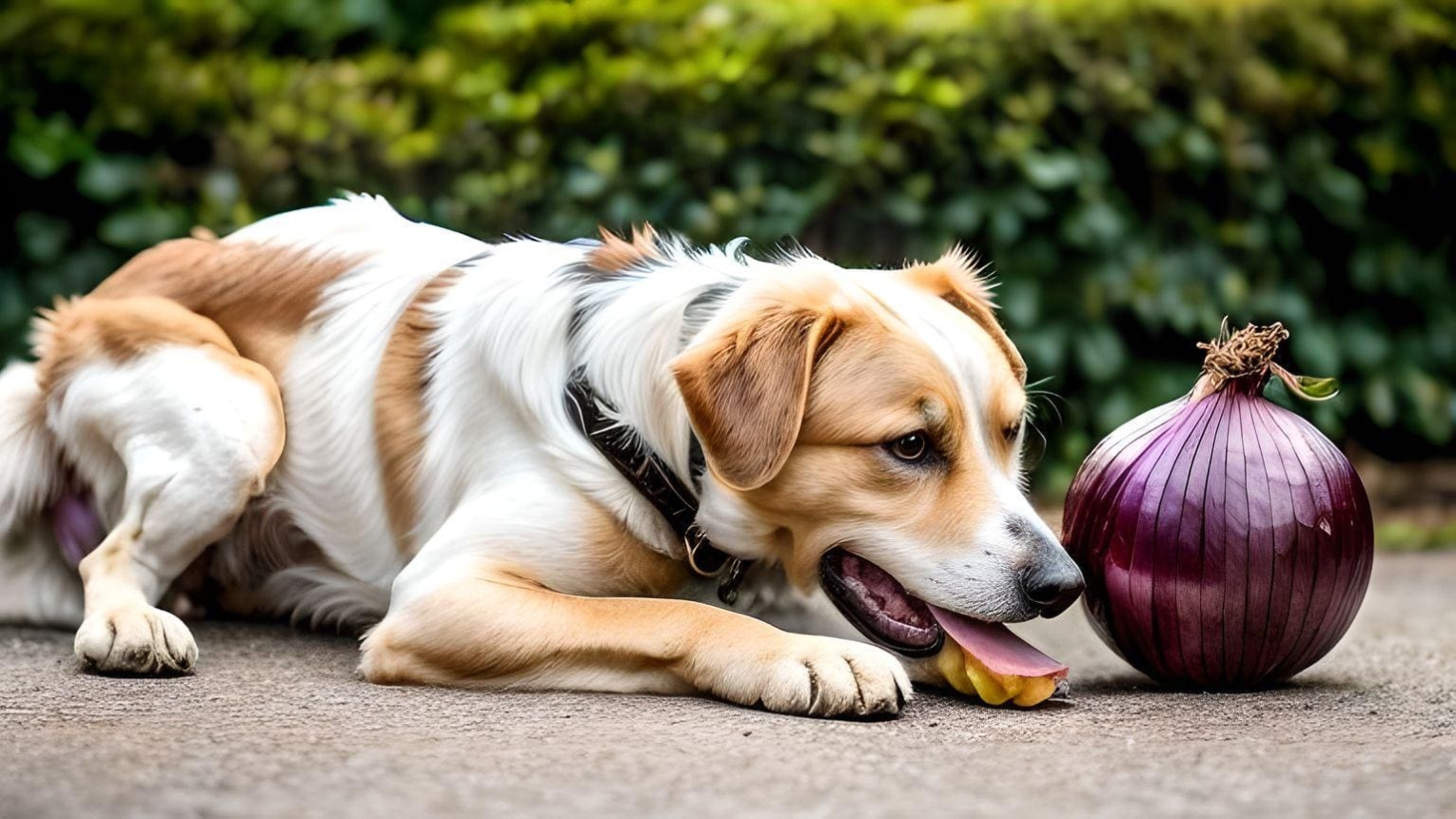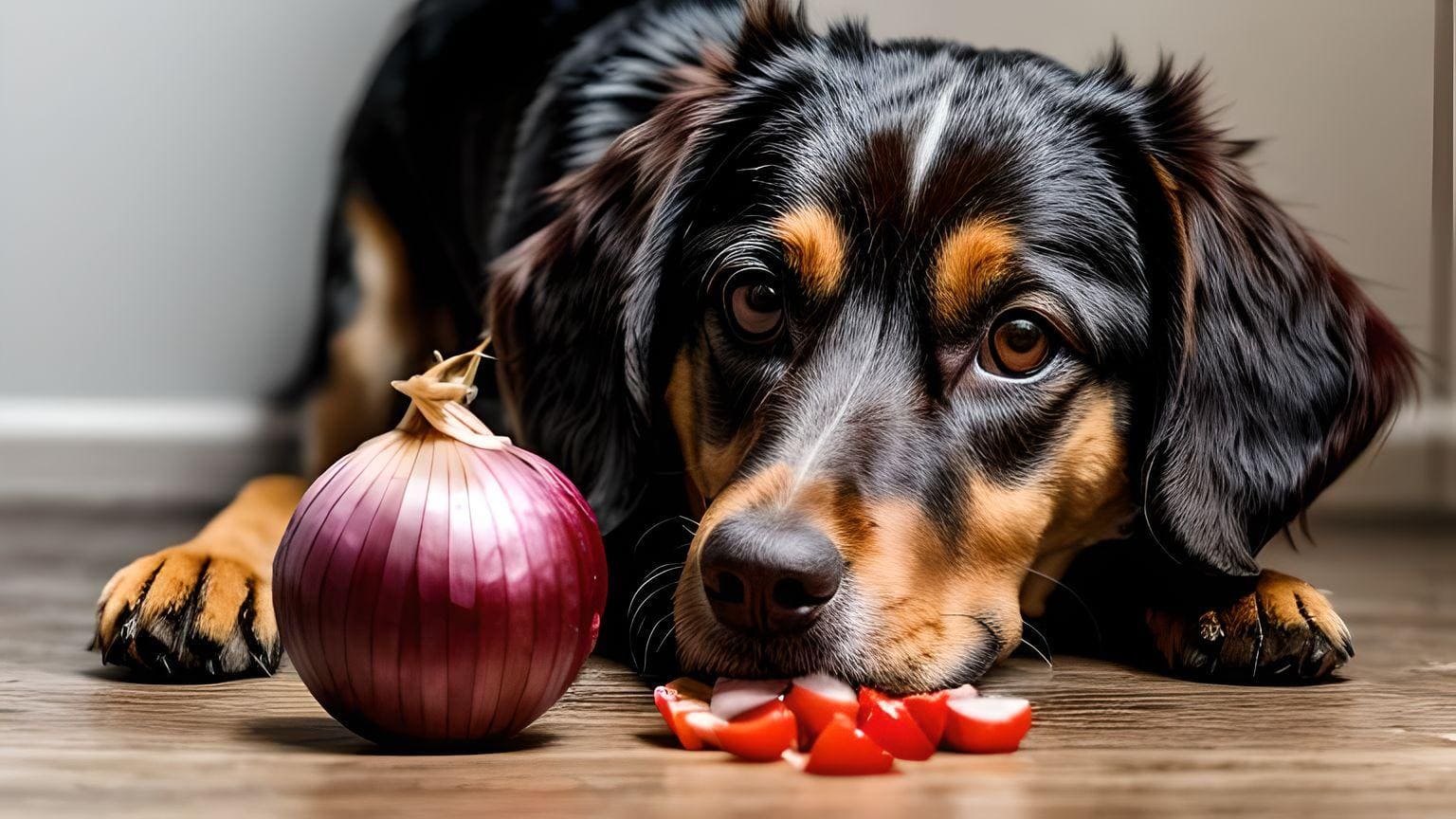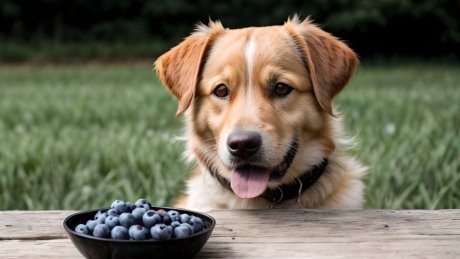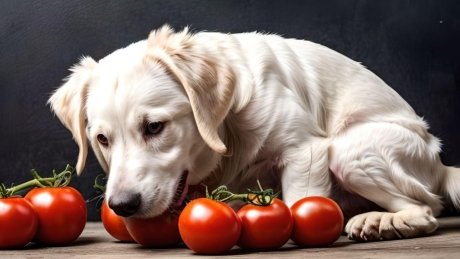Can Dogs Eat Onions: The Risks, 4 Symptoms, and Safe Practices
Dogs are not just our loyal companions; they are cherished members of our families. As responsible pet owners, we strive to provide them with the best care and nutrition possible. But when it comes to what our dogs can and cannot eat, there’s a lot of confusion and misinformation. One food item that has generated significant debate is onions. Can dogs eat onions safely, or are they harmful? In this comprehensive 6,000-word article, we will delve into the topic of dogs and onions, exploring the risks, symptoms of onion toxicity, and safe practices to ensure your furry friend’s well-being.
Onions: A Closer Look

1. The Onion Plant
Onions, scientifically known as Allium cepa, belong to the Allium family, which also includes garlic, leeks, and chives. These plants have been cultivated for thousands of years for their culinary and medicinal properties. Onions are characterized by their distinctive bulbous shape, multiple layers, and pungent aroma.
2. Nutritional Content of Onions
Onions are a source of several essential nutrients for humans, including vitamins, minerals, and dietary fiber. They contain vitamins such as vitamin C, vitamin B6, and folate, which are essential for overall health. Onions also provide minerals like potassium, which is important for maintaining proper nerve and muscle function, and manganese, which plays a role in bone formation and metabolism. Dietary fiber in onions aids in digestion and helps regulate blood sugar levels. Additionally, onions contain various phytochemicals, including quercetin and sulfur compounds, which have antioxidant and anti-inflammatory properties.
3. Human Consumption of Onions
While onions can be a nutritious and flavorful addition to human meals, they do not share the same benefits for dogs. In fact, onions can be toxic to dogs due to specific compounds found within the vegetable. To understand why onions are harmful to dogs, we need to explore the toxic components and how dogs metabolize them differently from humans.
Can Dogs Eat Onions?
No, dogs should not eat onions. Onions, as well as garlic and other related plants, contain compounds that are toxic to dogs. The toxic substances can cause a condition known as hemolytic anemia, which results in the destruction of red blood cells in a dog’s body. This can lead to serious health problems and, in severe cases, can be life-threatening.
Even small amounts of onions, including onion powder or cooked onions used as seasoning, should be avoided in your dog’s diet. Symptoms of onion toxicity in dogs can include vomiting, diarrhea, lethargy, rapid breathing, pale gums, and in more severe cases, collapse.

If you suspect that your dog has ingested onions or any product containing onions, it’s essential to seek immediate veterinary attention. Treatment may involve inducing vomiting, administering activated charcoal, and providing supportive care to counteract the toxic effects.
To keep your dog safe and healthy, it’s best to avoid feeding them any foods containing onions or garlic and to be cautious with foods seasoned with these ingredients.
Can Dogs Eat Cooked Onions:
Dogs should never be fed cooked onions. Even in their cooked form, onions retain the toxic compounds that are present in raw onions. Consuming cooked onions can lead to a condition known as hemolytic anemia in dogs. Hemolytic anemia is characterized by the destruction of red blood cells, which can result in symptoms such as weakness, vomiting, diarrhea, and, in severe cases, even life-threatening consequences. Therefore, it’s crucial to keep any food containing cooked onions away from your dog’s reach to ensure their safety and well-being.
Can Dogs Eat Green Onions:
Green onions, also referred to as scallions, are not safe for dogs either. Like regular onions, green onions contain the same harmful compounds that can lead to hemolytic anemia in dogs. Even in small quantities, green onions should not be included in a dog’s diet. It’s best to avoid any dishes that include green onions and opt for safer alternatives when preparing food for your pet.
Can Dogs Eat Onion Rings:
Onion rings are an absolute no for dogs. These delicious treats are made from onions, which, as previously mentioned, are toxic to dogs. Feeding onion rings to your dog can result in severe health issues. It’s important to be vigilant and never allow your dog to consume any food items that contain onions, such as onion rings.
Can Dogs Eat Red Onion:
Red onions are not an exception. They are just as toxic to dogs as other varieties of onions. The toxic compounds in red onions can lead to the same harmful consequences, so it’s crucial to ensure that your dog doesn’t ingest any form of onion, including red onions.
Can Dogs Eat Onion Powder:
Onion powder should be strictly avoided when it comes to your dog’s diet. Even a small amount of onion powder contains the toxic substances that can harm dogs. This seasoning should never be used in dishes for your pet, as it poses the same health risks as regular onions.
Can Dogs Eat Onions And Garlic:
Both onions and garlic are toxic to dogs. It’s important to understand that consuming either of these ingredients can be harmful. They contain similar toxic compounds that can lead to hemolytic anemia, gastrointestinal distress, and other adverse effects. Thus, any dish containing onions and garlic is unsafe for dogs.
Can Dogs Eat Sour Cream And Onion Chips:
Sour cream and onion chips are not suitable for dogs. These chips often contain onion powder and other seasonings that are harmful to dogs. Feeding your dog chips or any processed snacks is generally discouraged, as they often contain ingredients that can be detrimental to their health.
Can Dogs Eat Onions And Tomatoes:
Both onions and tomatoes can pose potential problems for dogs. While small amounts of ripe, cooked tomatoes are typically safe for dogs, it’s best to avoid any dishes that combine onions and tomatoes. Onions should always be kept out of your dog’s diet, and while tomatoes in moderation are usually safe, certain parts of the tomato plant can be toxic to dogs, so it’s important to exercise caution.
Can Dogs Eat Chicken Broth With Onions:
Chicken broth that contains onions is not safe for dogs. The presence of onions in the broth can result in onion toxicity, leading to various health issues. If you want to offer your dog some broth, ensure it is free from onions or any other harmful ingredients.
Can Dogs Eat Peppers And Onions:
While peppers themselves are generally not toxic to dogs, when cooked with onions, it’s best to avoid giving this combination to your dog. The presence of onions makes the dish unsafe for your pet. Dogs can enjoy some cooked or raw bell peppers in moderation, but it’s important to steer clear of onions in any form.
Why Are Onions Harmful to Dogs?
1. The Toxic Component: Allium Compounds
Onions, along with other members of the Allium family, contain compounds known as thiosulfates. Thiosulfates are responsible for the distinctive odor and taste of Allium vegetables. In particular, one thiosulfate compound called N-propyl disulfide has been identified as the primary toxic component in onions for dogs.
2. How Dogs Process Onions
Dogs metabolize certain substances differently from humans due to variations in their digestive and enzymatic systems. One such difference is their ability to break down and eliminate thiosulfates found in onions. In humans, the metabolism of thiosulfates occurs relatively efficiently, allowing us to consume onions without experiencing toxicity. However, dogs lack the necessary enzymes to process these compounds safely. As a result, thiosulfates accumulate in a dog’s system, leading to the production of harmful reactive oxygen species (ROS) and oxidative damage to red blood cells.
3. Onion Toxicity Levels
The toxicity of onions can vary depending on several factors, including the dog’s size, the type of onion, and the amount ingested. However, it’s crucial to understand that even small amounts of onions can be harmful to dogs. The severity of onion toxicity is often classified into different levels, including mild, moderate, severe, and fatal cases. The onset and severity of symptoms can vary from one dog to another, making early recognition and intervention critical.
Symptoms of Onion Toxicity in Dogs
Recognizing the symptoms of onion toxicity in dogs is crucial for early intervention and treatment. The signs can vary depending on the severity of the toxicity and the individual dog’s tolerance. Here are some common symptoms to watch out for:

1. Gastrointestinal Symptoms
- Vomiting: One of the initial signs of onion toxicity is vomiting. Dogs may vomit shortly after consuming onions or onion-containing foods.
- Diarrhea: Diarrhea is another gastrointestinal symptom that can occur in dogs with onion toxicity. The stool may be loose, watery, and may contain blood.
2. Hemolytic Anemia
As the toxic components of onions disrupt the normal function of red blood cells, dogs may develop symptoms of hemolytic anemia. These symptoms may include:
- Pale Gums: The gums and mucous membranes inside the dog’s mouth may appear pale or even white due to a decrease in the number of red blood cells.
- Lethargy: Dogs with onion toxicity may become lethargic and weak, often showing a lack of energy and interest in their usual activities.
- Rapid Heart Rate: An increased heart rate, or tachycardia, can be a sign of hemolytic anemia in dogs.
- Jaundice: In severe cases of onion toxicity, dogs may develop jaundice, which is characterized by yellowing of the skin, gums, and the whites of the eyes.
- Dark Urine: Hemolytic anemia can lead to the production of dark or brownish urine.
3. Organ Damage
In cases of severe onion toxicity, the damage to red blood cells and the release of ROS can lead to organ damage. This may manifest as:
- Difficulty Breathing: Dogs with severe onion toxicity may experience difficulty breathing due to a lack of oxygen-carrying capacity in the blood.
- Collapse: In extreme cases, dogs may collapse due to the combination of anemia and organ damage.
4. Neurological Symptoms
In rare instances, onion toxicity can result in neurological symptoms, such as seizures or disorientation. These symptoms may occur in severe cases where organ damage is extensive.
It’s important to note that the onset and severity of symptoms can vary from one dog to another. Additionally, some dogs may show symptoms shortly after consuming onions, while others may not exhibit signs until hours or even days later. Therefore, if you suspect your dog has ingested onions or onion-containing foods, it’s crucial to seek veterinary care immediately, even if they are not yet displaying symptoms.
Treatment for Onion Toxicity
If you suspect that your dog has consumed onions or is showing symptoms of onion toxicity, it’s essential to take immediate action and seek professional veterinary care. Early intervention can significantly improve the chances of a positive outcome. Here are the steps involved in treating onion toxicity in dogs:

1. Immediate Actions
- Contact Your Veterinarian: The first and most crucial step is to contact your veterinarian or an emergency animal clinic. Provide them with all relevant information, including the type and amount of onions or onion-containing foods your dog consumed and when the ingestion occurred.
- Induce Vomiting: If the ingestion of onions occurred within the last two hours and your dog is not already vomiting, your veterinarian may instruct you on how to safely induce vomiting at home. This should only be done under veterinary guidance.
- Activated Charcoal: In some cases, your veterinarian may recommend administering activated charcoal to help absorb any remaining toxins in the digestive tract. Activated charcoal can be administered orally and should only be given under veterinary supervision.
2. Veterinary Care
- Hospitalization: Depending on the severity of the toxicity, your dog may require hospitalization for observation and treatment. This is especially true if they are showing symptoms of hemolytic anemia or organ damage.
- Intravenous Fluids: Dogs with onion toxicity often require intravenous (IV) fluids to maintain hydration and support kidney function. IV fluids also help flush out toxins from the body.
- Blood Transfusions: In severe cases of onion toxicity where there is a significant reduction in red blood cells, a blood transfusion may be necessary to replace the damaged cells and improve oxygen-carrying capacity.
- Medications: Your veterinarian may prescribe medications to address specific symptoms or complications. These may include medications to control vomiting, treat gastrointestinal irritation, or support the liver and other affected organs.
- Monitoring: During hospitalization, your dog will be closely monitored for changes in vital signs, blood chemistry, and red blood cell counts. Adjustments to treatment will be made as needed.
3. Supportive Care
- Nutritional Support: Dogs with onion toxicity may have a decreased appetite or difficulty eating. In such cases, your veterinarian may provide nutritional support through feeding tubes or specialized diets.
- Supplemental Oxygen: If your dog is experiencing difficulty breathing due to anemia, they may receive supplemental oxygen to improve oxygenation of tissues.
4. Follow-Up Care
- Recovery and Home Care: Once your dog stabilizes and begins to show signs of improvement, your veterinarian will provide guidance on transitioning back to a regular diet and home care.
- Follow-Up Visits: Follow-up visits with your veterinarian may be necessary to monitor your dog’s progress and ensure a full recovery.
It’s important to understand that the treatment for onion toxicity can be intensive and may require hospitalization for an extended period. The outcome largely depends on the severity of the toxicity and the timeliness of treatment. Therefore, prompt action and seeking professional veterinary care are essential in cases of onion ingestion or suspected toxicity.
Onions in Different Forms: Are Some Safer Than Others?
Not all forms of onions are equally toxic to dogs. Some preparations and onion-containing products may pose a lower risk, while others can be highly dangerous. Here, we’ll explore various forms of onions and their potential impact on your dog’s health.
1. Cooked Onions
Cooked onions, such as those used in soups, stews, and sautéed dishes, are still toxic to dogs. The cooking process does not eliminate the toxic compounds present in onions, and in some cases, it may even concentrate them. Therefore, it’s essential to avoid feeding your dog any dishes containing cooked onions.
2. Dehydrated Onions
Dehydrated onions, often found in commercial products like onion soup mix or certain snack foods, are also a concern. The dehydration process does not remove the toxic compounds, and the concentrated flavor can make these products even more appealing to dogs. Foods containing dehydrated onions should be kept out of reach of pets.
3. Onion Powder
Onion powder is another form of onions that can be highly concentrated and problematic for dogs. It is commonly used as a seasoning in various processed foods and can be challenging to detect if it’s present. Always check food labels for onion powder and avoid feeding such products to your dog.
4. Onion-Flavored Foods
Many human foods are flavored with onion extracts or additives. This includes items like onion-flavored chips, snacks, and condiments. Even if these
products do not contain visible pieces of onion, they can still pose a risk due to the presence of onion flavorings. As a rule of thumb, avoid sharing any onion-flavored foods with your dog.
It’s important to maintain vigilance in the kitchen and when sharing food with your dog. Be aware of the ingredients in the dishes you prepare and the foods you allow your dog to consume. Even small amounts of these onion-containing products can lead to toxicity over time.
How Much Onion is Dangerous for Dogs?
The toxicity of onions in dogs is dose-dependent, meaning that the severity of the toxicity is directly related to the amount of onions ingested. Understanding how much onion is dangerous for dogs is essential for pet owners to make informed decisions about their dog’s diet and safety.

1. The Concept of Dose-Dependent Toxicity
Dose-dependent toxicity means that the toxic effects of onions become more severe as the quantity of onions consumed increases. In other words, a small amount of onions is less likely to cause severe toxicity compared to a larger amount. However, it’s essential to recognize that even small amounts of onions can be harmful, especially in smaller dog breeds.
To illustrate the concept of dose-dependent toxicity, consider the following scenarios:
- Scenario 1: A small bite of a dish containing cooked onions may cause mild gastrointestinal upset in a large breed dog but is unlikely to be immediately life-threatening.
- Scenario 2: A medium-sized dog consuming a significant portion of a meal containing onions is at a higher risk of developing moderate to severe onion toxicity, including gastrointestinal symptoms and potential anemia.
- Scenario 3: A small breed dog ingesting even a small amount of onions, such as a portion of onion-flavored snack food, may experience severe onion toxicity due to their smaller size and reduced tolerance for the toxic compounds.
Given the variability in tolerance between individual dogs and the potential for cumulative toxicity over time, it’s best to err on the side of caution and avoid feeding dogs any amount of onions or onion-containing foods.
2. Calculating Safe Onion Consumption
While it’s challenging to pinpoint an exact quantity of onions that is universally safe for all dogs, there are general guidelines that can help pet owners make safer choices. These guidelines are based on the size of the dog and the known toxic dose of onions.
Here is a rough estimate of safe onion consumption based on a dog’s size:
- Small Dogs (e.g., Chihuahuas, Pomeranians): Even a small amount of onions, such as a teaspoon, can be dangerous for small dogs. It’s best to avoid onions entirely in their diet.
- Medium Dogs (e.g., Beagles, Bulldogs): For medium-sized dogs, a small quantity of onions, such as a tablespoon or two, can potentially lead to toxicity. Avoid feeding them any onions or onion-containing foods.
- Large Dogs (e.g., Labrador Retrievers, German Shepherds): Larger dogs have a higher tolerance, but it’s still advisable to avoid feeding them any onions or onion-containing dishes. Even moderate amounts can lead to symptoms of toxicity.
It’s important to note that these are rough estimates, and individual tolerance can vary. Additionally, factors such as the type of onion and the specific thiosulfate content can affect toxicity levels. Therefore, the safest course of action is to exclude onions from your dog’s diet altogether and opt for alternative, safe treats and snacks.
Preventing Onion Toxicity in Dogs
Prevention is the best approach to ensure your dog’s safety when it comes to onions. Responsible pet ownership involves being aware of the potential risks and taking proactive steps to minimize them. Here are some practical measures to prevent onion toxicity in dogs:
1. Foods to Avoid
- Onions in Any Form: As a general rule, avoid feeding your dog any form of onions, including raw, cooked, dehydrated, or powdered onions.
- Foods Containing Onions: Be cautious when sharing human foods with your dog, as many dishes and processed products contain onions or onion derivatives. Check food labels for ingredients like onion powder or onion extract.
- Restaurant Scraps: Avoid feeding your dog leftovers or restaurant scraps that may contain onions or onion-flavored ingredients.
- Table Scraps: Educate family members and guests about the dangers of feeding table scraps to your dog, especially if onions are present in the meal.
2. Educating Yourself and Your Family
- Awareness: Educate yourself and your family members about the risks of onions to dogs. Ensure that everyone in your household understands the importance of avoiding onions in the dog’s diet.
- Food Preparation: When preparing meals at home, be mindful of the ingredients used and take precautions to prevent dogs from accessing onions or onion-containing foods.
3. Safe Storage and Disposal
- Secure Storage: Store onions and onion-containing products in a secure, inaccessible location, such as a locked cabinet or pantry. This helps prevent accidental ingestion by pets.
- Proper Disposal: Dispose of onion scraps and peels in a secure trash receptacle, preferably one that is not easily accessible to dogs. Do not leave them in a compost pile or open garbage bin.
- Food Storage Containers: Ensure that food storage containers are tightly sealed to prevent pets from accessing leftover dishes that may contain onions.
By adopting these preventive measures and staying informed about the risks associated with onions, you can significantly reduce the likelihood of onion toxicity in your dog. Responsible pet ownership entails being proactive and making informed decisions about your dog’s diet and safety.
Conclusion:
In the world of pet ownership, ensuring the health and safety of our dogs is paramount. The question of whether dogs can eat onions is not one to be taken lightly, as onions pose a significant risk of toxicity to our canine companions.
Throughout this comprehensive article, we’ve explored the various aspects of dogs and onions, from the composition of onions to the mechanisms of toxicity, symptoms, treatment, and prevention. It is clear that onions should be entirely excluded from a dog’s diet to safeguard their well-being.
Responsible pet ownership involves not only providing love and companionship but also making informed choices about nutrition and safety. By understanding the risks associated with certain foods, like onions, and taking proactive steps to prevent exposure, you can ensure that your furry friend enjoys a long and healthy life by your side.
As you continue your journey as a pet owner, remember that knowledge is your greatest ally. Stay informed, stay vigilant, and always prioritize the health and happiness of your beloved canine companion.
Frequently Asked Questions:
-
Can dogs eat small amounts of onions?
No, dogs should not consume any amount of onions or onion-containing foods. Even small quantities of onions can be toxic to dogs, and the severity of toxicity is dose-dependent. Given the potential risks and variability in individual tolerance, it is safest to completely avoid onions in a dog’s diet.
-
What should I do if my dog accidentally eats onions?
If you suspect or know that your dog has ingested onions or onion-containing foods, take immediate action:
1. Contact your veterinarian or an emergency animal clinic for guidance.
2. If advised by your veterinarian, induce vomiting if ingestion occurred within the last two hours.
3. Do not attempt to treat your dog at home without professional guidance.
4. Seek prompt veterinary care for evaluation and treatment. -
Are there any breeds more susceptible to onion toxicity?
While all dogs can be affected by onion toxicity, smaller dog breeds may be more vulnerable due to their size and reduced tolerance for toxic compounds. However, onion toxicity can occur in dogs of any breed and size, so it’s essential to avoid onions in the diet of all dogs, regardless of their breed.
Recommended:
Trazodone For Dogs : A Comprehensive Guide to Its Uses, Benefits, and Risks
Metronidazole For Dogs | 4 Common Uses, Dosage, Side Effects, Care Tips





























